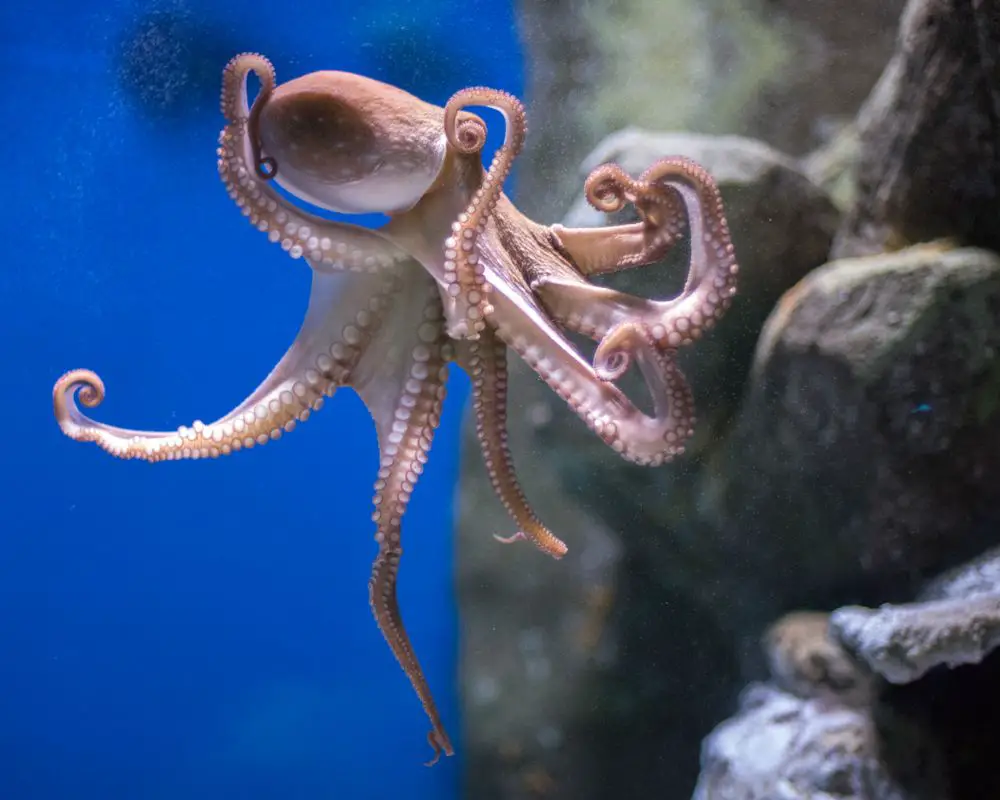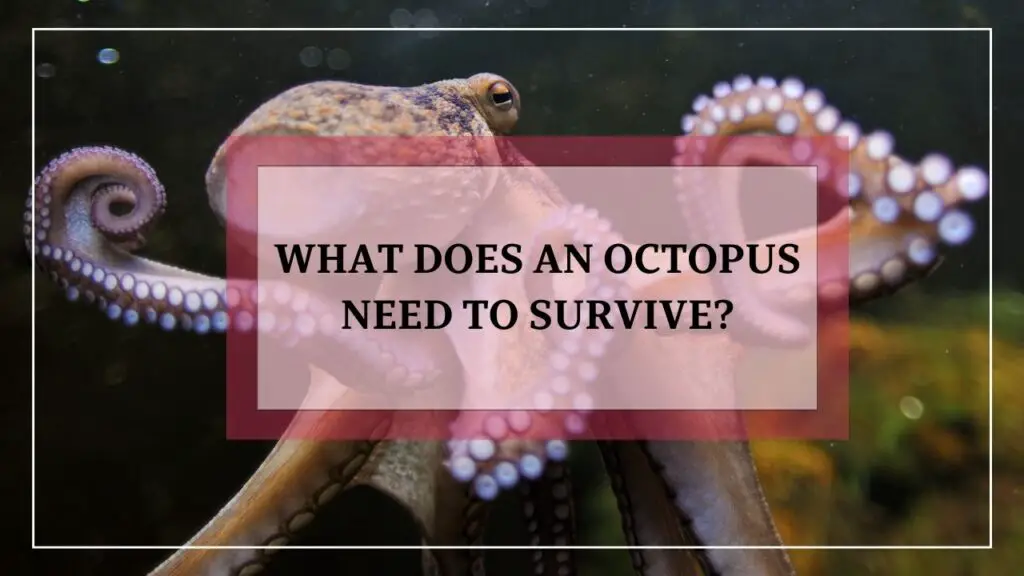Today, we’re diving into the amazing world of octopuses, those clever creatures of the sea. Have you ever wondered what octopuses need to survive and thrive in their underwater homes? Well, you’re in luck because we’re about to uncover the secrets!
So, what do octopuses need to survive? Octopuses are fascinating animals with special needs, just like you and me.
They require a suitable habitat, including the right temperature and water quality, as well as hiding spots to stay safe from predators. Octopuses are carnivorous, meaning they love to feast on yummy seafood like crabs and shrimp. They’re incredibly intelligent, so they need mental stimulation and enrichment to keep their minds sharp. And of course, maintaining a clean and healthy environment is crucial for their well-being.
Join me as we explore the world of octopuses and discover how we can help these incredible creatures thrive in their watery homes. Let’s dive right in!
Habitat And Environment

Octopuses are like the ultimate beach bums, but instead of sandy shores, they have some favorite spots in the big blue sea. Let’s check it out!
Diverse Dwellings
Octopuses are true globetrotters, and you can find them in various environments across the oceans. They’ve got a thing for diversity! Some of their favorite hangouts include vibrant coral reefs, rugged rocky shores, and swaying seagrass beds. Talk about having a taste for adventure!
Temperature, Salinity, And Depth: The Perfect Recipe
Now, let’s talk about their specific preferences when it comes to their underwater homes. Octopuses are quite particular about their water conditions. They like it just right! They prefer temperatures that suit their cozy bodies, salinity levels that make them feel at home, and specific depth ranges where they can strut their stuff.
Imagine if you had a remote control to adjust the temperature of your room, the perfect saltiness in your French fries, and a magical elevator to take you to your favorite hangout spot. That’s what octopuses are all about!
Hide And Seek Champions
Now, let’s dive into the importance of hiding spots for our sneaky octopus friends. Picture yourself playing hide and seek with your friends. You’d want a good hiding spot, right? Well, octopuses feel the same way!
Octopuses have a natural talent for finding the coolest hiding spots in the ocean. They love squeezing into crevices, curling up in caves, and snuggling in other secret nooks. Why, you ask? Well, these hiding spots are like their own personal fortresses! They protect themselves from the ocean’s bullies, also known as predators, and help them plan their clever hunting strategies. It’s like having your superhero hideout!
Home Away From Home: Aquarium Edition
Okay, now let’s bring the ocean into your living room! If you’re lucky enough to have an octopus buddy in an aquarium, it’s crucial to provide suitable hiding spots for them. You want them to feel right at home, don’t you?
By creating artificial hiding spots in the aquarium, like little caves or cool decorations, you’re giving your octopus pal a safe and cozy space. It’s like building a mini octopus mansion! These hiding spots not only make them feel secure but also keep them entertained and mentally stimulated. It’s like having your private reading nook or a super cool gaming den!
Diet and Feeding Habits
These creatures are true carnivores, meaning they have a taste for meat! Let’s uncover what makes their bellies rumble and their taste buds tingle.
Seafood Lovers
Octopuses have a refined palate for seafood. They’re like the ultimate sushi connoisseurs of the ocean! Their menu mainly consists of small invertebrates such as crabs, mollusks, and shrimp. These tasty treats provide them with the nutrients they need to stay strong and healthy.[1]
Imagine having a seafood buffet every day, with all your favorite dishes lined up. Well, that’s how octopuses feel when they find a delicious crab or a mouthwatering shrimp—they can’t resist!
Masterful Hunters
Now, let’s uncover the hunting techniques that make octopus masters of the sea. Imagine you’re playing a game of tag. Octopuses take their hunting game just as seriously, but instead of running, they use their incredible tentacles to capture their prey.
Octopuses are stealthy stalkers, patiently observing their potential meal from a safe distance. When the moment is right, they launch into action! They can ambush their prey in a blink of an eye, using their tentacles to wrap around them and secure a tasty meal. It’s like having a superhero’s superpower—you know, those cool heroes who always catch the bad guys!
A Balanced Menu
In the wild, octopuses enjoy a diverse menu with plenty of options. It’s like going to a fancy restaurant and having an array of delicious dishes to choose from. But here’s the catch: replicating their natural feeding habits in captivity can be quite challenging.
One of the challenges is providing a varied diet. Octopuses need different types of food to ensure they get all the essential nutrients. Just like you need a balanced meal with protein, carbohydrates, and vitamins, octopuses need a diverse menu to keep their tummies happy.
Feeding Frequency and Enrichment: Keeping Octopuses Full and Fulfilled!
A Full Belly: The Importance Of Regular Feeding
Octopuses have quite the appetite, my friends! They need regular meals to fuel their bodies and keep their metabolic rates in check. Just like you need breakfast, lunch, and dinner to keep your energy levels up, octopuses rely on consistent feeding.
Feeding them at the right frequency ensures they have enough energy to go about their underwater adventures. So, keep that food coming, and your octopus friend will be one happy camper!
Enriching Mealtimes: Food Puzzles And Interactive Feeding
Now, let’s talk about making mealtimes more exciting and engaging for our clever cephalopod pals. Octopuses are intelligent creatures, and they need mental stimulation to keep their minds sharp. That’s where environmental enrichment comes into play!
Imagine eating your favorite snack, but instead of simply grabbing it from a plate, you have to solve a fun puzzle to get to it. Well, octopuses love a good food puzzle! By providing them with interactive feeding techniques, such as hiding food in puzzle toys or challenging mazes, you’re giving their brains a workout while satisfying their hunger. It’s like combining dinner and a brain teaser—double the fun!
The Balanced Feast: Supplements For A Nutritious Diet
To ensure our octopus friends receive all the necessary nutrients, it’s important to offer a balanced diet. Sometimes, replicating their wild menu can be tricky, so we need to give them a helping hand.
Supplements come to the rescue! Just like you might take a vitamin pill to supplement your diet, octopuses may benefit from nutritional supplements too. These supplements provide those extra vitamins and minerals that might be missing from their regular menu, keeping them in tip-top shape.
Behavioral and Cognitive Stimulation
Octopuses are some of the smartest creatures in the sea. They can figure out puzzles, solve tricky tasks, and even unscrew jars! It’s like having a little underwater Einstein swimming around.
Just like you love solving puzzles or playing challenging games, octopuses need mental stimulation too. They thrive on engaging in activities that make them think, just like those riddles that make your brain go “Aha!” Providing mental stimulation is vital for their well-being and overall happiness.
An Enriched Mind: Preventing Octopus Boredom
Imagine having nothing to do all day but stare at the same wall. Boring, right? Well, octopuses feel the same way! To keep their minds sharp and prevent boredom, they need plenty of mental stimulation. After all, an idle mind is an unhappy mind.
That’s where we come in! By providing enrichment activities, we can keep our clever cephalopod pals entertained and mentally stimulated. Think of it as a playdate for their brains! Puzzles, mazes, and interactive toys are all fantastic ways to challenge their problem-solving skills and keep their minds buzzing with excitement.
ٍSocial Behaviour: Lone Rangers Of The Sea
Octopuses are known for their solitary nature. They’re like the cool lone wolves of the underwater world. Unlike some other sea creatures who love to hang out with their buddies, octopuses prefer to go solo.
But hey, we all need some social interaction in our lives, right? Well, octopuses have their exceptions too! In certain situations, social interaction can be beneficial for them. It’s like having a best friend to share secrets with!
Tank Mates And Social Compatibility
If you’re thinking of introducing some tank mates to your octopus buddy, it’s important to choose wisely. Octopuses have specific preferences when it comes to their companions. Just like you want to be surrounded by friends who make you feel good, octopuses need compatible tank mates who won’t stress them out.
So, when introducing potential buddies, keep a close eye on their interactions. Look for signs of compatibility, like calm behavior and mutual curiosity. It’s like setting up a playdate for your octopus friend, making sure everyone gets along swimmingly!
Water Quality and Maintenance
Just like you need a clean and cozy room to thrive, octopuses require pristine waters for their well-being. Let’s explore how we can provide them with the ultimate underwater paradise!
The Goldilocks Zone: Ideal Water Parameters
Octopuses are quite particular about their water conditions—they want it just right! Just like you prefer your bathwater to be warm and soothing, octopuses have their preferences. They enjoy temperatures around [ideal temperature], a pH level between [ideal pH], salinity levels similar to [ideal salinity], and, of course, ample oxygen to breathe.
Maintaining these optimal water parameters is crucial for their health and happiness. It’s like having the perfect recipe for a delicious meal or the ideal conditions for your favorite plant to grow big and strong!
Testing, Testing: Regular Water Checks
To ensure our octopus friends are swimming in a safe and comfortable environment, regular water testing is essential. It’s like giving their home a health check-up!
By testing the water parameters at regular intervals, we can monitor any fluctuations and make necessary adjustments to maintain stability. Just like you visit the doctor for a check-up, we need to test the water to ensure it’s in top shape. So grab your water testing kit and become an underwater scientist!
Filters And Tank Setup: Keeping Waters Sparkling Clean
A well-functioning filtration system is like having a superhero guardian for our octopus tank. It helps maintain high water quality and keeps their home free from any unwanted pollutants. After all, who wants to swim in dirty water?
Choosing an appropriate filtration system, such as [recommended filtration system], is vital. It ensures efficient removal of waste and toxins, keeping the water crystal clear. But that’s not all! A well-established biological filter, which consists of beneficial bacteria, plays a crucial role in breaking down harmful substances and maintaining a healthy balance in the tank.
The Clean Team: Regular Water Changes And Maintenance
Just like you tidy up your room and take out the trash, we need to keep our octopus tanks clean and fresh! Regular water changes are key to maintaining a clean and healthy environment for our octopus friends. It’s like giving their home a makeover!
Performing regular water changes helps remove any accumulated waste and ensures optimal water quality. It’s like taking a refreshing shower—it rejuvenates and keeps everything squeaky clean. Don’t forget to give the tank a good scrub too, to keep algae and other unwanted hitchhikers at bay.
Conclusion
In conclusion, creating a suitable habitat, providing a balanced diet, ensuring mental stimulation, and maintaining pristine water quality is essential for the well-being of our octopus friends. By understanding their unique needs and preferences, we can offer them a comfortable and enriching environment.

